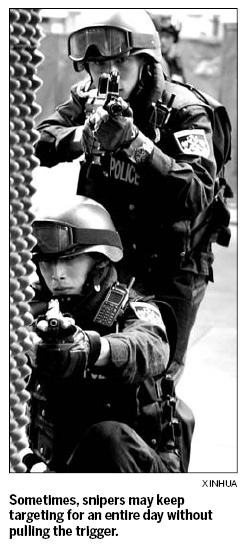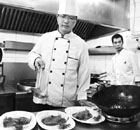Focus
Taking aim at the elite career of SWAT sniper
By Meng Jing (China Daily)
Updated: 2010-05-11 07:55
 |
Large Medium Small |
Law enforcement experts took no chances when a knife-wielding man took a 5-year-old hostage in the capital last week, shooting him dead and freeing his victim.
The incident came in the wake of a string of deadly knife assaults on school children across the country that has seen four knife attacks in four provinces in a month leave eight children dead and at 52 injured.
With public safety in the spotlight, an official with the Beijing Special Weapons and Tactics (SWAT) team shares some of the elite squad's secrets with METRO.

Q: How do you choose snipers?
A: All the snipers are chosen from the Beijing SWAT team. While there are no strict rules about the height and weight of our snipers, their eyesight must be excellent.
The weapon they use is around 3.5 kg and sometimes police snipers need to hold it for hours. So, it's not difficult for people to imagine the physical requirements of a sniper. Plus, they all need to pass written tests exploring their psychology - some of the questions may not seem to make sense and they have to choose the first answer that comes into their heads.
Q: What is the essential quality of a sniper?
A: Definitely a good psychological attitude. Snipers need to be stable and calm all the time. They need to endure loneliness. Sometimes, they may keep targeting for an entire day without pulling the trigger once. They cannot talk, eat or drink during that time. Targeting is a very difficult job because an accident could happen if they lose their concentration.
Q: What kind of training do snipers usually get?
A: The basics are physical training - the use of weapons, climbing walls, etc. They train more than 12 hours a day and often get practice in hostage situations. Sometimes, they will get called at midnight to practice for a sniping task. They practice sniping in all kinds of extreme weather, including windy and snowy days. Apart from scenarios, the basic practice they often get is 100 m distance shooting indoors. Due to the height of buildings and city planning in Beijing, 100 m practice is enough for police snipers in the capital.
Q: What's the job of an assistant sniper?
A: Their key task is observation and passing information to the main sniper. Assistant snipers need to have keen powers of observation. They need to observe the conditions at the scene, even the speed of the wind. Snipping is never a solo job. Teamwork and the communication between the two snipers is crucial for the success of the mission. The pair always trains together in order to guarantee smooth communication between them. More often, the two don't need to talk at all; a glance can replace many words.
Q: What's in a snipers' mind when they are at the scene?
A: Nothing should come to their mind when they are at the scene. Once they find a suitable position to start targeting, they just keep focusing on the target without any thoughts in their minds. They will not move their finger until they get the order to do so. But once they get permission to shoot, they can decide when is the best time to pull the trigger. They will not shoot until they are 100 percent sure they will hit the target which usually happens three to five seconds after they get permission to shoot.
Q: Is it possible that a sniper may miss his target?
A: That is not possible. The sole standard for being a sniper is to take a life with one bullet. A SWAT police member usually trains for three years to become a sniper. And a sniper often reaches his golden year at the age of 30. They will not be able to regard themselves as snipers until they have performed in a real situation.
However, it doesn't mean that snipers are killers. They only pull the trigger when they have to. Most of the situations do not require a bullet because police negotiators can usually diffuse the situation.
Most snipers may not pull the trigger once in a real situation in their entire professional career.







